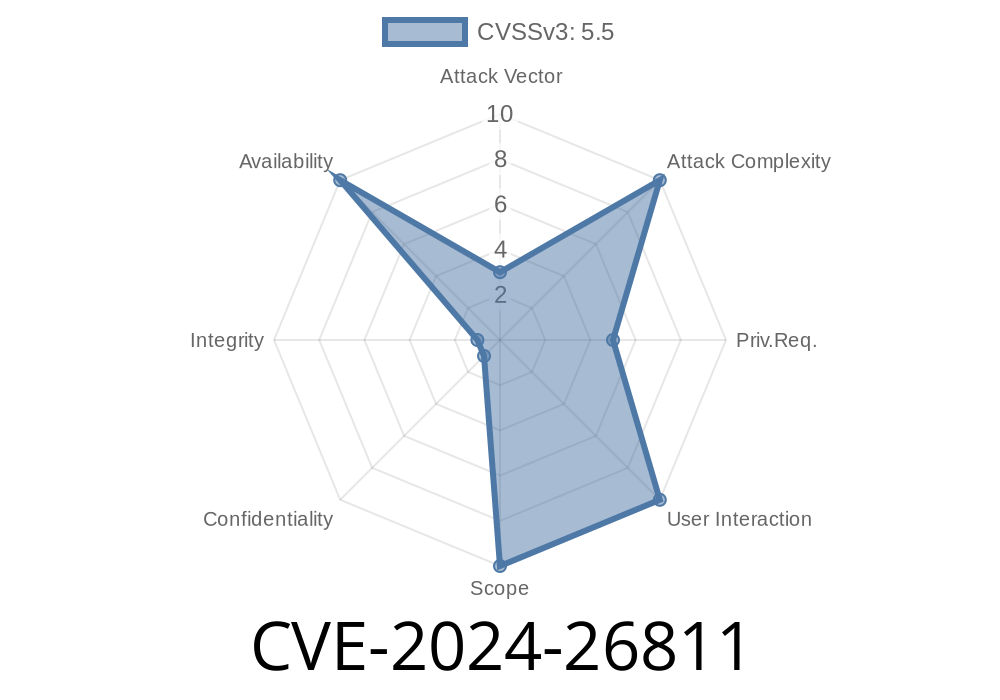Recently, the Linux community patched a security issue registered as CVE-2024-26811 in the kernel's KSMBD server. This bug could allow malicious userspace processes, specifically crafted ksmbd-tools, to send specially crafted messages that lead to memory corruption or a kernel panic—potentially allowing for denial of service or even privilege escalation.
This post will break down the vulnerability, show you relevant code snippets, give you exploit details, and help you understand how this bug got fixed.
What is KSMBD?
KSMBD is a relatively new kernel SMB (Server Message Block) daemon introduced to serve SMB/CIFS (Windows file sharing) directly from the Linux kernel. To handle things like mounting shares, KSMBD talks to a userspace daemon called ksmbd.mountd using an internal IPC (inter-process communication) channel.
The Vulnerability in Simple Terms
If you install a malicious or compromised version of ksmbd-tools, the software running as ksmbd.mountd can send back a bogus IPC response when the kernel requests information. Before the fix, KSMBD in the kernel didn't carefully check the response's payload size. This meant the kernel might process too much or too little data, leading to dangerous situations like _memory overrun_ or _slab-out-of-bounds_ reads/writes.
Such bugs are classics: trusting user input without checking lengths is one of the oldest flaws in the book!
Exploit Details
Suppose an attacker manages to install a custom or trojanized ksmbd-tools package or compromise the host enough to swap out /usr/sbin/ksmbd.mountd.
The attacker crafts a short or overlong IPC reply buffer.
2. The kernel KSMBD code expects a certain amount of data but, before the patch, didn't check what actually came back.
The kernel then overreads or overwrites slab memory.
4. This leads to memory crashes, information leaks, or forms the basis for kernel-level exploits: privilege escalation or full denial of service.
The specific function handling IPC responses did not validate payload length, e.g.
// Before the patch: No size validation!
int ksmbd_ipc_process_reply(int cmd, char *data, int len) {
void *payload = kmalloc(len, GFP_KERNEL);
memcpy(payload, data, len); // May overrun if len is too big!
// Further code...
}
After the patch, the code checks that the payload size matches expectations
// After the patch: Validates size before copying
int ksmbd_ipc_process_reply(int cmd, char *data, int len) {
int expected_len = get_expected_length(cmd);
if (len < || len > expected_len) {
pr_err("Invalid IPC response length for cmd %d: %d\n", cmd, len);
return -EINVAL;
}
void *payload = kmalloc(len, GFP_KERNEL);
memcpy(payload, data, len);
// Further code...
}
The patch commit verifies the payload for three different IPC responses, closing the loophole.
Build a small C program mimicking ksmbd.mountd.
2. When the kernel requests data, respond with a specially crafted, very long or suspiciously short message.
Observe kernel log errors, crashes, or potential memory leaks.
This kind of primitive can sometimes be shaped into a new privilege escalation or local DoS if you can control the contents enough to overwrite critical kernel pointers.
Patch submitted: Feb 21, 2024
- Patch commit (git.kernel.org)
- CVE Record at cve.org
Upgrade ksmbd-tools and your Linux kernel to the latest security-patched versions.
- Do not allow untrusted userspace daemons or binaries—especially those running privileged services.
Conclusion
CVE-2024-26811 is a reminder that kernel code should _never_ trust userspace length and payload. Even for internal IPC, always validate what you're given. This swift fix prevented a potentially nasty class of vulnerabilities in SMB file sharing for Linux servers—critical for mixed Windows-Linux environments.
More Links
- Linux KSMBD documentation
- GitHub: ksmbd-tools
- OSS Security Mailing List
Timeline
Published on: 04/08/2024 10:15:08 UTC
Last modified on: 03/27/2025 21:37:50 UTC
